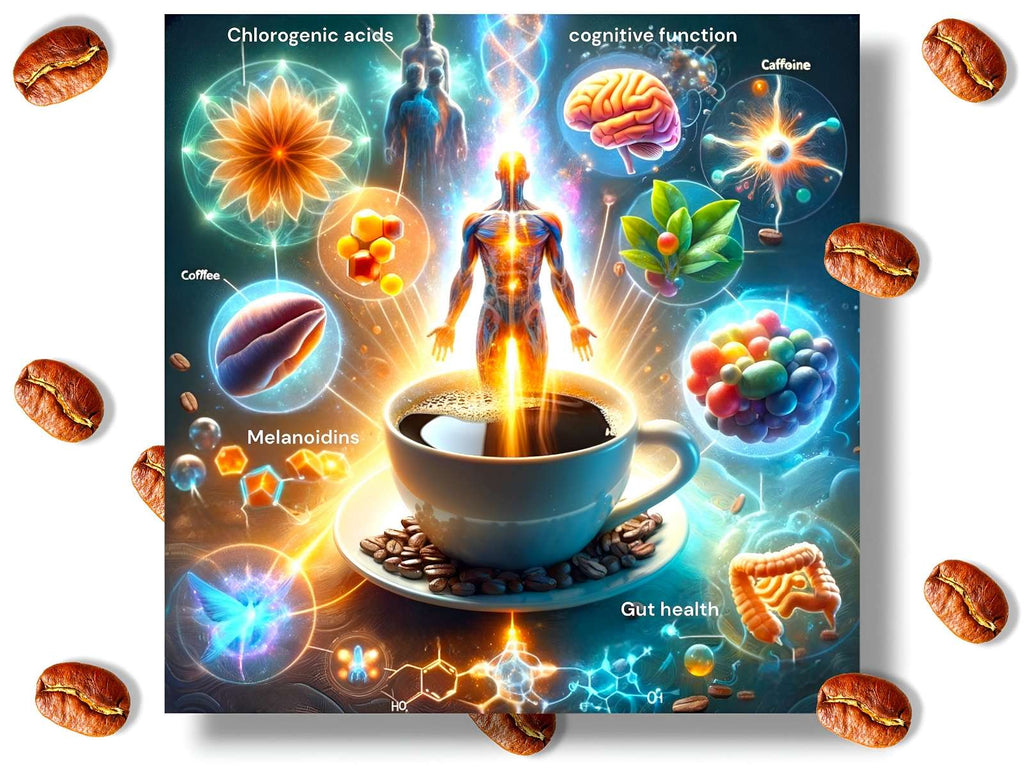How Does Our Coffee Embrace Nature’s Best?

Exploring the vast array of culinary delights, we uncover the potential health-focused benefits of specialty-grade coffee, particularly those offered by General Warfield’s. Diverging from ordinary coffees, our specialty grade roasts distinguish themselves through our meticulous cultivation, harvesting, roasting, and packaging processes. These careful steps not only enhance our coffee's flavor but also preserve natural antioxidants and potentially beneficial compounds, offering a unique experience for health-conscious consumers.
This isn't merely about indulging in a cup of joe; it's about experiencing a potion crafted by the hands of time and expertise. But beyond its exquisite taste, specialty grade coffee may harbor secrets to health that are as compelling as the narratives woven by its rich aroma. Our dedication to excellence enhances each roast's unique characteristics and natural compounds, contributing to exceptional taste, aroma, and a growing list of potential health benefits.
As mentioned above, specialty-grade coffee, such as General Warfield’s, distinguishes itself not just through its quality and flavor profiles—meticulously assessed and rated—but also through its cultivation, harvesting, and roasting processes. This comprehensive approach ensures that only the finest beans, grown under optimal conditions, are selected. Let's delve into the heart of this matter, uncovering the many naturally occurring compounds within our coffee and their potentially salutary effects on our well-being.
Key Health-Promoting Compounds in General Warfield’s Specialty Coffee

Let's take a detailed look into how antioxidant-rich coffee, a hallmark of General Warfield’s offerings, may contribute to a health-conscious lifestyle. Join us as we explore our antioxidant-rich and healthy compound loaded coffee and its potential health benefits, making every cup from General Warfield’s a wise, rewarding, delicious, and naturally great choice. We believe our coffee is the best specialty coffee option for individuals looking for nature's best offerings without compromising on taste, aroma, and experience:
Antioxidants Galore: Specialty grade coffee is a treasure trove of antioxidants, including chlorogenic acids and melanoidins. Chlorogenic acids, in particular, are celebrated for their role in mitigating inflammation and combating oxidative stress - two culprits implicated in chronic diseases. Melanoidins, formed during the roasting process, not only contribute to the rich flavor and color of coffee but also possess antioxidant and anti-inflammatory properties.
These compounds work in concert to shield our cells from the ravages of free radicals, thereby potentially reducing our risk of conditions such as heart disease and certain cancers. Theoretically this makes specialty grade coffee among the best coffee options to help combat inflammation and oxidative stress.
The Cognitive Conductor: Then there's caffeine, the most widely recognized psychoactive substance in the world, revered for its ability to enhance mental alertness and stave off fatigue. But the symphony of benefits extends further; research suggests that caffeine may bolster cognitive functions over the long haul, potentially lowering the risk of neurodegenerative diseases like Alzheimer's and Parkinson's. It's a testament to how this stimulant, in moderation, may tune the brain to a state of heightened clarity and resilience.
The Metabolic Maestro: Beyond its cognitive crescendo, research supports that caffeine may accelerate the tempo of our metabolism, aiding in fat burning and weight management. Studies show that this compound stimulates the nervous system, signaling the breakdown of fat cells and enhancing physical performance by making fatty acids available for energy. This metabolic modulation may not only assist in weight control but may also support cardiovascular health by improving glucose control and reducing the risk of type 2 diabetes.
*It must be noted that caffeine's impact on alertness, cognitive function, and metabolism varies widely among individuals. Excessive caffeine consumption can lead to side effects such as restlessness, insomnia, and increased heart rate. We recommend enjoying coffee in moderation and consulting with a healthcare provider if you have concerns regarding caffeine intake.
A Harmonious Gut: Specialty grade coffee may also play a melodious tune for gut health. The plethora of antioxidants and other beneficial compounds found in gourmet beans, such as General Warfield’s, may positively influence the gut microbiome, encouraging the growth of good bacteria and fostering a balanced digestive ecosystem. This can lead to improved digestion and a reduced risk of gastrointestinal disorders.
Table 1. Health-promoting Compounds and Possible Effects Summarized
| Benefit | Description |
|---|---|
| Antioxidants Galore | Rich in chlorogenic acids and melanoidins, may help mitigate inflammation and combat oxidative stress, potentially reducing the risk of chronic diseases. |
| The Cognitive Conductor | May enhance mental alertness, support cognitive functions, and potentially lower the risk of neurodegenerative diseases. |
| The Metabolic Maestro | Boosts metabolism, may aid in fat burning and weight management, improved glucose control, and cardiovascular health. |
| A Harmonious Gut | May improve gut health by influencing the gut microbiome, encouraging the growth of good bacteria, and fostering a balanced digestive ecosystem. |
The Healthy Compounds in Our Coffee in More Detail

Each sip of General Warfield’s coffee carries a symphony of natural chemicals, compounds, and antioxidants linked to a growing body of research and evidence on coffee's potential health benefits. Here’s a curated list of many of these constituents found in our coffee and an exploration of their possible health benefits:
1. Caffeine: The most famous psychoactive compound in coffee, caffeine, stimulates the central nervous system, which may enhance alertness, concentration, and energy levels in some individuals. It may also improve mental function, physical performance, and may lower the risk of neurodegenerative diseases. However, we recommend enjoying coffee in moderation and consulting with a healthcare provider if you have concerns regarding caffeine intake, as caffeine's impact varies widely among individuals.
2. Chlorogenic Acids (CGAs): These are a group of polyphenolic compounds that have antioxidant and anti-inflammatory properties. CGAs may help in lowering blood pressure and improving glucose metabolism, contributing to a reduced risk of type 2 diabetes and heart disease.
3. Diterpenes: Compounds such as cafestol and kahweol are found in the oily part of coffee and have been shown to have anti-inflammatory and anticarcinogenic properties. However, they might raise cholesterol levels when consumed in high amounts from unfiltered coffee.
4. Trigonelline: A bitter alkaloid that becomes niacin (vitamin B3) during the roasting process. Niacin may aid in DNA repair and maintenance, and trigonelline itself has been studied for its neuroprotective and antibacterial properties.
5. Melanoidins: Formed during the roasting process, these are responsible for the rich brown color of coffee. They have antioxidant and antimicrobial properties and may contribute to the modulation of gut health by promoting the growth of beneficial bacteria.
6. Quinic Acid: This contributes to the acidic taste of coffee and has antioxidant properties, potentially offering protective benefits against oxidative stress.
7. Cafestol and Kahweol: These diterpenes, found in the oil of coffee beans, may have anti-inflammatory and anticancer effects. They are higher in unfiltered coffee, like French press or Turkish coffee.
8. Ferulic Acid: Another antioxidant, ferulic acid can help to neutralize free radicals and may enhance vascular health by reducing inflammation and improving endothelial function.
9. Theobromine and Theophylline: These compounds are similar to caffeine and can have a mild stimulatory effect on the central nervous system. Theobromine, in particular, can also dilate blood vessels and have a diuretic effect.
See table below for brief summary:
Table 2. Healthy Compounds and Detailed Benefits Summarized
| Compound | Benefits |
|---|---|
| Caffeine | Stimulates the central nervous system, may enhance alertness, concentration, and energy levels; may also improve mental and physical performance; may lower risk of neurodegenerative diseases. |
| Chlorogenic Acids (CGAs) | Antioxidant and anti-inflammatory properties; may lower blood pressure and improve glucose metabolism; may contribute to reduced risk of type 2 diabetes and heart disease. |
| Diterpenes | Anti-inflammatory and anticarcinogenic properties; includes cafestol and kahweol; may raise cholesterol levels in unfiltered coffee. |
| Trigonelline | Becomes niacin during roasting; aids in DNA repair and maintenance; neuroprotective and antibacterial properties. |
| Melanoidins | Responsible for coffee's rich brown color; antioxidant and antimicrobial properties; may promote the growth of beneficial gut bacteria. |
| Quinic Acid | Contributes to coffee's acidic taste; antioxidant properties, may offer protection against oxidative stress. |
| Cafestol and Kahweol | Found in the oil of coffee beans; possible anti-inflammatory and anticancer effects; higher in unfiltered coffee. |
| Ferulic Acid | Antioxidant; neutralizes free radicals; may enhance vascular health by reducing inflammation and improving endothelial function. |
| Theobromine and Theophylline | Similar to caffeine; mild stimulatory effect on the central nervous system; theobromine can dilate blood vessels and have a diuretic effect. |
The interaction of these compounds within the human body may confer a range of benefits, including improved mental and physical performance, protection against certain diseases, enhanced metabolic health, and possibly even a longer lifespan. However, it's important to note that the effects of coffee can vary greatly among individuals, depending on genetic variations affecting caffeine metabolism and other factors. Moderation is key, as excessive and extreme consumption can lead to negative side effects, such as anxiety, digestive issues, and disrupted sleep patterns.
Not All Compounds Are Good: Certain Precautions Must Always Be Taken

The journey of coffee from bean to cup involves several crucial steps that can significantly impact not only its flavor profile but also its health implications. That's why General Warfield's Coffee takes every step possibble to minimize any hazards and harmful compounds.
Ensuring Your Coffee Is Safe: Our Process

At General Warfield's Coffee, we focus on minimizing harmful compounds in our coffee by using sustainable and leading industry practices in our state-of-the-art, FDA-approved facility. Our team includes experienced, globally recognized artisan roasters and highly trained food scientists who ensure the highest safety and quality standards. Our meticulous bean handling and roasting processes are designed to reduce or eliminate harmful compounds, ensuring our coffee meets the highest standards without compromise.
Here's a list of potentially harmful compounds and how we address them through our careful handling and processing:
1. Acrylamide: This potentially harmful chemical can form in coffee beans during the roasting process. Acrylamide has been associated with cancer risk in animal studies, although the evidence in humans is still inconclusive. Light to medium roasting and controlling the time and temperature can help reduce acrylamide levels, while still preserving the flavor and beneficial compounds thus enhancing the low-acrylamide coffee benefits of these roast profiles. Because our roasts are roasted between medium to medium-dark, our coffees are naturally low-acrylamide coffees. By prioritizing low-acrylamide coffee roasting techniques, General Warfield’s Coffee actively reduces health risks, offering a safer cup of joe.
2. Ochratoxin A (OTA): OTA is a mycotoxin produced by certain molds that can grow on coffee beans when they are improperly stored. This toxin has been linked to kidney damage and possibly cancer in humans. Proper drying and storage of green coffee beans, as well as sorting and discarding damaged beans, can significantly reduce OTA contamination. Roasting has also been shown to decrease OTA levels in coffee beans.
3. Polycyclic Aromatic Hydrocarbons (PAHs): PAHs are formed when organic matter burns, and they can be found in smoked foods, air pollution, and also in coffee if beans are roasted at very high temperatures or come into direct contact with flames. PAHs are considered carcinogenic. Employing roasting methods that avoid direct flame contact and controlling roasting temperatures can reduce the formation of PAHs in coffee.
4. Cafestol and Kahweol: While not inherently harmful and even possessing some beneficial properties, these diterpenes can raise cholesterol levels, particularly LDL ("bad" cholesterol), when consumed in high amounts. This effect is most pronounced with unfiltered coffee like French press or espresso. Proper brewing methods, such as using paper filters, can significantly reduce the amounts of cafestol and kahweol in the final cup of coffee, thus mitigating their impact on cholesterol.
Table 3. Compounds We Take Extra Caution With Summarized
| Hazard | Summary & Mitigation |
|---|---|
| Acrylamide | Potentially harmful, forms during roasting. General Warfield's Coffee employs medium to medium-dark roasting to reduce levels, enhancing safety. |
| Ochratoxin A (OTA) | A mycotoxin linked to kidney damage and cancer. Minimized by proper drying, storage, and sorting of beans, with roasting further decreasing levels. |
| Polycyclic Aromatic Hydrocarbons (PAHs) | Formed at high temperatures or direct flame contact, considered carcinogenic. Avoided by using roasting methods that prevent direct flame contact. |
| Cafestol and Kahweol | Diterpenes that can raise LDL cholesterol in unfiltered coffee. Impact reduced by brewing methods, such as using paper filters. |
It's important to recognize that the potential health risks associated with these compounds are typically very low for most individuals, especially when coffee is consumed in moderation as part of a balanced diet. However, at General Warfield's Coffee we go to great lengths and take every extra step to apply proper handling, storage, and roasting techniques to ensure great tasting coffee for your health. We always prioritize safe coffee roasting, handling, storage, and packaging practices throughout the entire process. Our commitment to safe coffee roasting practices underscores General Warfield’s dedication to health-conscious consumers. Drink General Warfield's Coffee and savor every sip without worry. Cheers!





